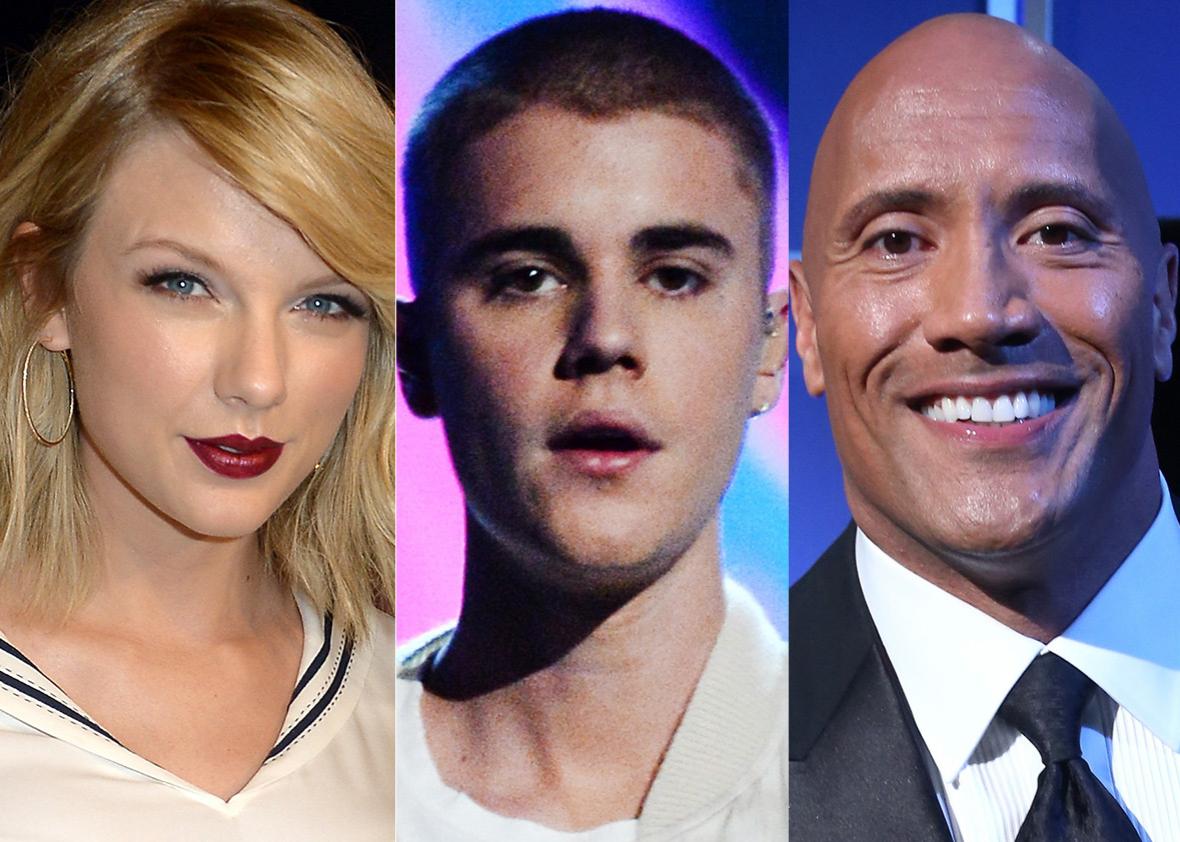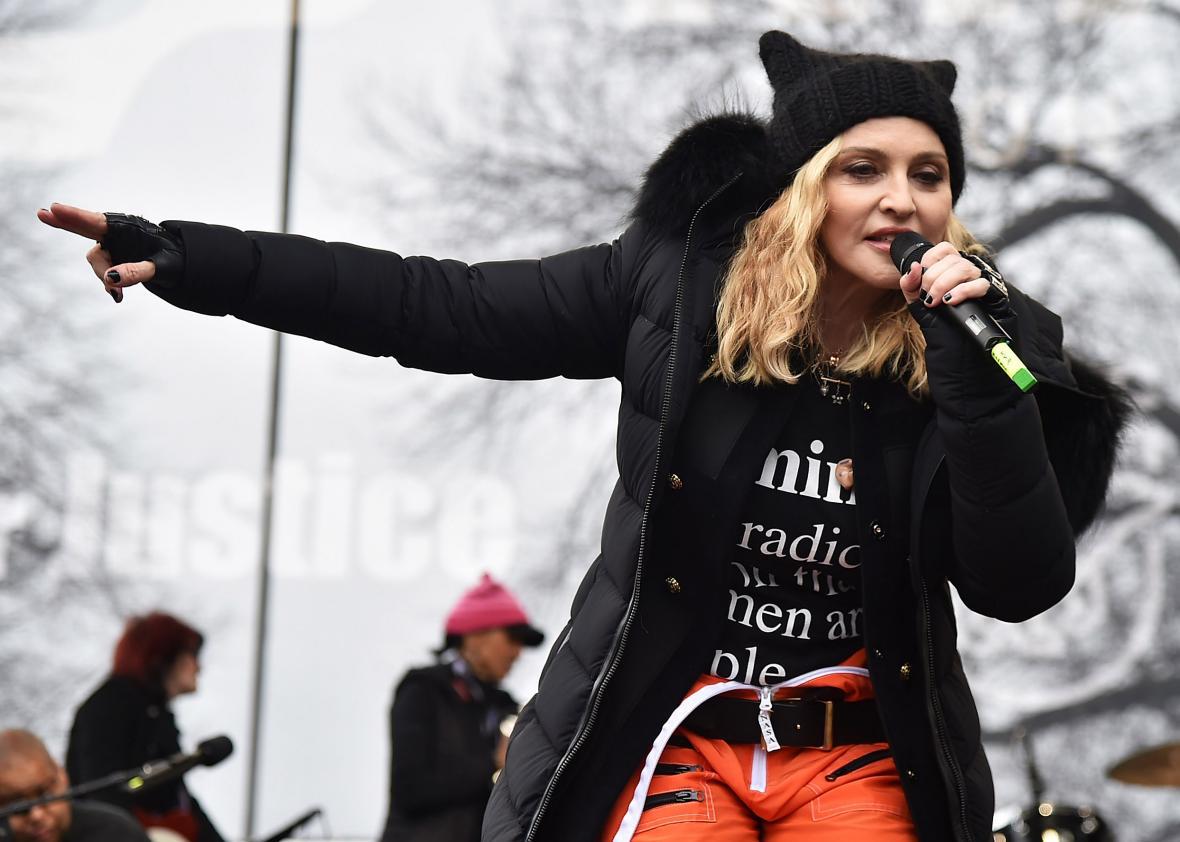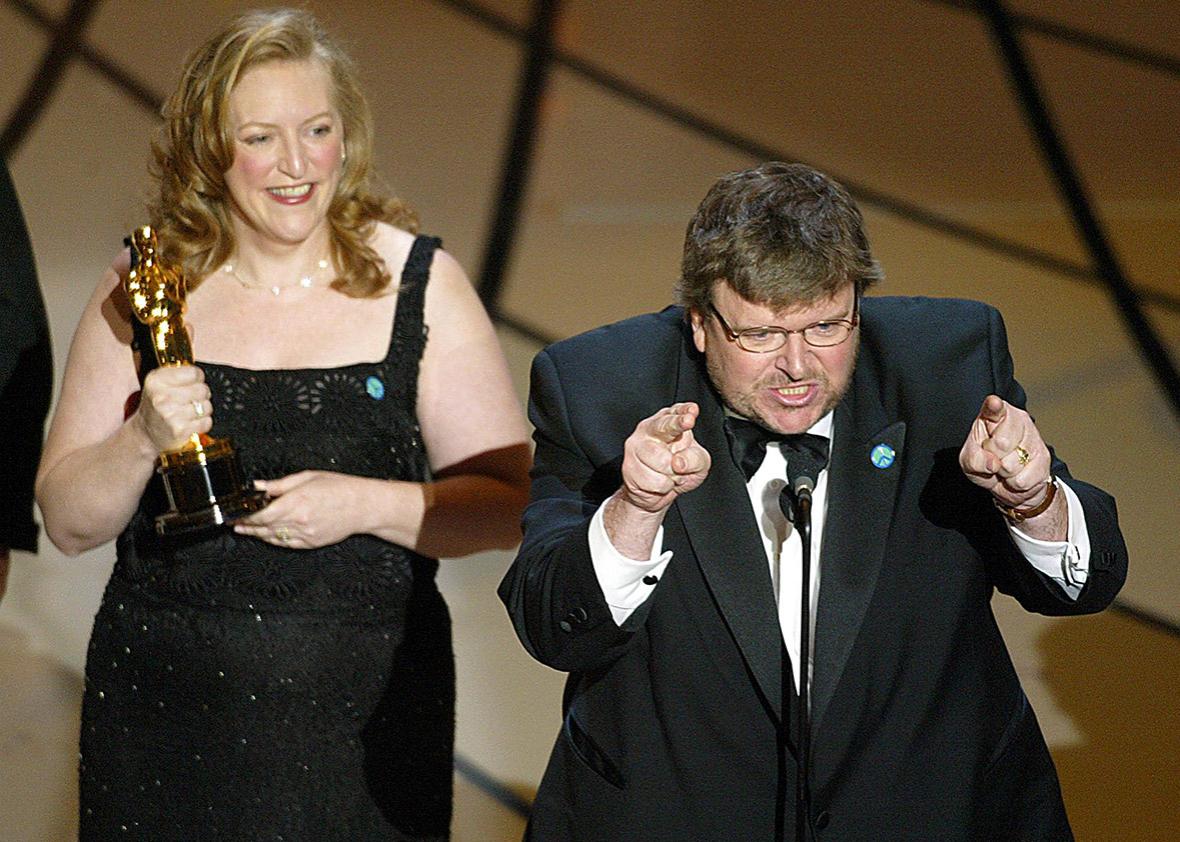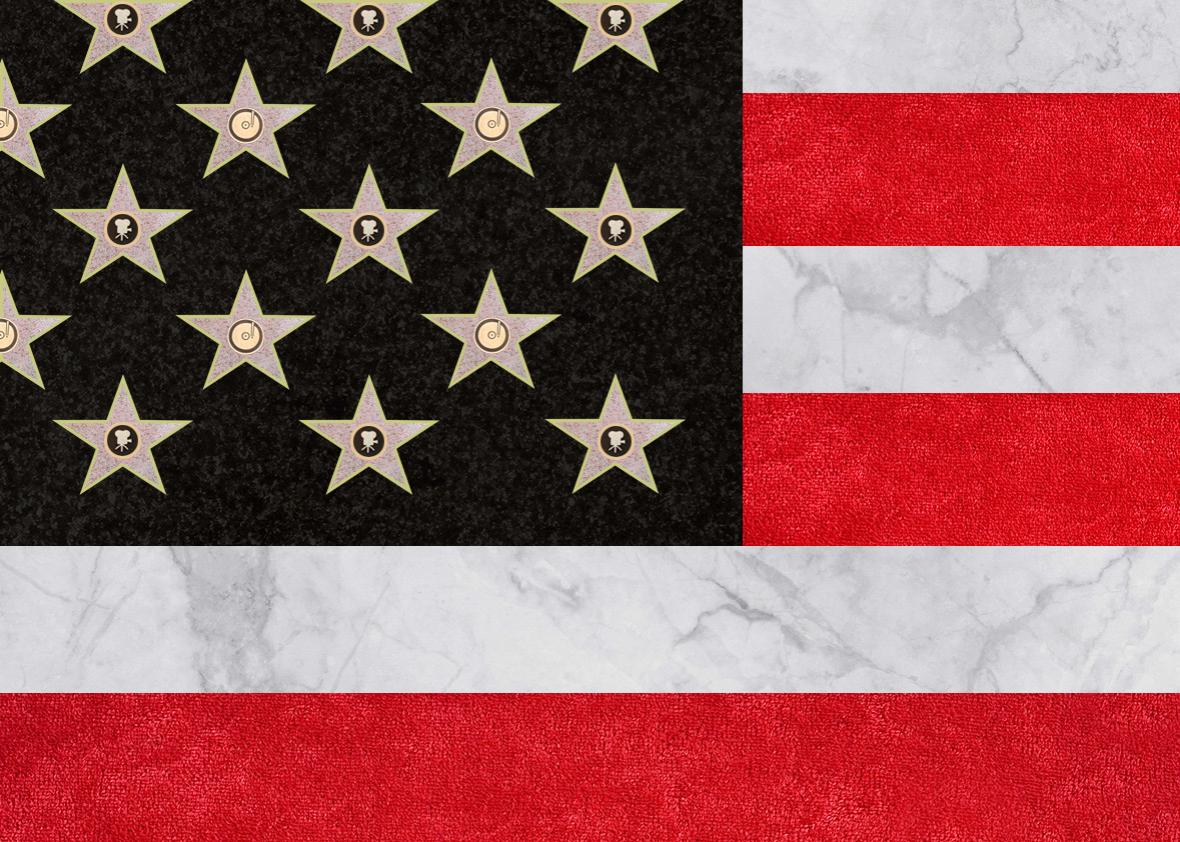Last week, Katy Perry performed her new single, “Chained to the Rhythm,” at the Grammy Awards. Dressed in white sneakers, a white blazer with black lapels, and a white armband emblazoned with a pink-sequined “persist,” Perry bopped around in front of a reflective picket fence. “Chained to the Rhythm” sounds like a lackadaisical party anthem, something to nod along to while lounging in a hammock drinking a fluorescent beverage out of a novelty straw, which is to say, it sounds like Katy Perry. But the lyrics have an agenda: “Trapped in our white picket fence/ like ornaments/ so comfortable, we’re living in a bubble, bubble/ so comfortable, we cannot see the trouble, trouble.” The end of the performance amplified this dissonance, as the set became a giant projection of the Constitution, while Perry posed triumphantly in front of the words “We the People” and barked, “No hate!”
Welcome to celebrity in the Age of Trump, when the imperatives of entertainment and the imperatives of resistance bang and clang against each other like a copy of the Constitution papered over a Katy Perry jam. Responding both to the dictates of conscience and their million-dollar brands, every single celebrity, from the wokest to the meekest, must decide how to address a Donald Trump presidency in a climate where silence speaks almost as loudly as wearing a pussy hat and the right award show speech can handily overshadow a Cabinet appointment. “Matthew McConaughey Lectures Hollywood on Trump,” the New York Times declared on Feb. 2 alongside a string of urgent headlines about the travel ban. For better or worse, these are the proportions of the national interest.
The celebrity political news cycle usually goes like this: A famous person insults Trump. The insult goes viral, with Fox News, Breitbart, and the rest of the conservative yellow press spinning the anti-Trump antics as evidence of pencil necked liberals’ out-of-touchness. (“New Katy Perry Song Encourages Anti-Trump Riots” was Infowars’ headline about the Perry performance). Meanwhile, liberals, pencil-necked and otherwise, wring their hands and worry that saying nothing might have been more effective, as others deem the behavior heroic. (Especially if Trump responds directly to the provocation, in which case: worth it.) In an era of unique polarization, stars have been weaponized by the right and left in a zero-sum game of embarrassment and consolation.
However a celebrity responds to Trump, our responses to their responses are pre-ordained along partisan lines. Trump has divided the American public so cartoonishly and neatly, as partisan politics have given way to partisan bubbles, that reactions, even to theatrical acts of celebrity resistance, feel fated. Rather than respond to a celebrity’s cri de coeur (or heartfelt display of brand management) solely on its merits, each side runs it through a filter—is it good for the cause?—and then dismisses or embraces it accordingly. As a way of changing minds, celebrity activism has never felt more futile. As a way of performing solidarity, it’s never been more required.
The rules of engagement used to be clearer. A celebrity could opt into politics, opt into having a cause, opt into representing a presidential candidate. Now, even if celebrities wants to opt out of the current moment, they can’t. (Black artists were facing this conundrum before 2016 when deciding how to respond, or not, to police brutality and the Black Lives Matter movement.) Doing nothing is doing something. Silence either signifies “I’m for Trump” or “I’m for myself.” Any high-profile Instagram or Twitter feed that stayed quiet in the immediate wake of the election was read as a show of conspicuous reticence. Taylor Swift, Bruno Mars, the Rock, Tom Cruise, P. Diddy, and Chris Pratt are just some of the celebrities who have been called out for saying nothing at all. Swift, in particular, has spawned a cottage industry of takes on how she personally could have swung the election.

Gustavo Caballero/Getty Images for Tommy Hilfiger; Kevin Winter/Getty Images; Jesse Grant/Getty Images for NAACP Image Awards
But a celebrity can get criticized just as much for wading in. If you’re a generally apolitical actress like Nicole Kidman, you can respond to a question about Trump buried at the tail end of an interview about your most recent film by saying, “I’m always reticent to start commenting politically …. But he’s now elected and we as a country need to support whoever is president” and suddenly find yourself accused of being a Trump supporter, who then has to clarify that your comments were not meant as an endorsement. If you’re a late-night host like Jimmy Fallon, you can do what late-night hosts have done for years and lamely lob softball questions at a presidential candidate, and people will also hold you personally responsible for the election results.
The savviest stars have found a way to seamlessly match their protests with their personas: Katy Perry’s political engagement has the pizzazz of a party song (“Persist”! In sequins!); Meryl Streep’s infamous Golden Globes speech is another fantastic, meandering, charming Meryl Streep award show speech that burnishes her unparalleled reputation as much as it takes Donald down a peg; Jeffrey Wright’s twitter feed has the brainy zip that befits a brilliant thespian; Shia LaBeouf’s now-canceled Trump art project had LaBeouf’s sought-after cruddy DIY aesthetic; Shailene Woodley’s low-key grass-roots work for Bernie and protest of the Dakota Access Pipeline aligns with her low-key quirkiness. Above it all, Beyoncé hovers, managing the politics of art and the art of politics with apparent ease. On-brand politicking is now a full-fledged prerequisite for doing celebrity right.
* * *

Theo Wargo/Getty Images
There was a time when stars were not insulated by the political unanimity of their bubbles, and so protesting felt bigger, braver, less safe. (Football players and country stars still aren’t.) For refusing to go to Vietnam, Muhammad Ali’s title was revoked and he was banned from boxing. For telling Lady Bird Johnson that which she didn’t want to hear about Vietnam, Eartha Kitt was blacklisted for a decade. Richard Nixon tried to deport John Lennon for his anti-war activism. For claiming that she wanted to blow up the White House, Madonna … apologized, suffering through one round of the 24-hour backlash cycle.
Mixing politics and performance used to be considered a breach of decorum. In 1973, when Sacheen Littlefeather accepted an Academy Award on Marlon Brando’s behalf, to protest Hollywood’s treatment of Native Americans, she was booed—and then blacklisted—allegedly with John Wayne hissing in the wings. In 2003, Michael Moore won an Academy Award for his anti-gun documentary Bowling for Columbine and was booed for his remarks, delivered days after the start of the invasion of Iraq. “We live in fictitious times. We live in a time when we have fictitious election results that elect a fictitious president,” Moore said, comments that would almost surely bring the house down if they were to be delivered this weekend at the Oscars. After the 1993 telecast, in which Susan Sarandon and Tim Robbins stiffly cited the 250 Haitians being held in Guantánamo Bay because they had AIDS and Richard Gere more conversationally called attention to Tibet, producer Gil Cates said, “I wouldn’t invite them to my home, and I wouldn’t invite them to a future show. [For] someone who I invited to present an award to use that time to postulate a personal political belief I think is not only outrageous, it’s distasteful and dishonest.”

Timothy A. Clary/AFP/Getty Images
The 2017 Oscars are sure to be one of the most politically minded award shows in recent history, but one where there will almost certainly be no real frisson within the theater (at least not about Trump: One could imagine a speech confronting #OscarsSoWhite having some heat to it), if endless amounts of attention. There are no apolitical cultural spaces in contemporary America now, where we can kick back, bipartisanly muss one another’s hair, and talk about something else. Award shows, in particular, have become a kind of proxy battle between the left and the right. The goal is not convincing each other of anything but rousing the troops, either the night of or the morning after.
It is now protocol to undercut and obscure the self-congratulatory nature of giving an awards speech by turning said speech into a symbol of something larger. It is no longer considered couth to treat awards shows, as Sally Field once did, as an extremely gratifying popularity contest. (How very “me decade” of her!) This has resulted in countless moving, expansive speeches, advocating for everything from racial diversity to gay rights and climate change, while also being responsible for Tom Hiddleston’s recent Golden Globes spiel in which he told a self-aggrandizing story about how his miniseries The Night Manager had brought “relief and entertainment” to the people of Sudan.
Celebrities have been performing their politics for a long time; it’s been more than five decades since John Lennon merged his anti-war activism with his socially aware, love-in brand. But now they have been drafted into a kind of mandatory politicking, while still being held to the standard of their profession. This is a new challenge for entertainers. Their politics must be both politics and diversion, politics and brand management. Amy Schumer’s earnest, angry, engaged Instagram might turn off some bipartisan fans looking only for a laugh, but it’s of a piece with her honest, combative comedy. Taylor Swift plays coy with the left, a relationship marked by such longstanding tension that she’ll one day be able to write a dis track about it. Lena Dunham’s more charming and productive efforts for Hillary were undermined by self-inflicted slip-ups—the two-steps-forward, one-step-back dance that is itself quintessentially Dunham.
Those protests felt “authentic” in that they jibed with the stars’ images. Meanwhile some shrewd celebrities have harnessed politics in the service of productively modifying that image. Before Katy Perry became a devoted Hillary surrogate and took her first forays into protest art, she was known for wearing bras that shoot whipped cream. Now, she has something to say—and you can still bop along to it. She has evolved into a more serious-seeming artist without changing her sound, just her stage sets. Lady Gaga took to the streets protesting Donald Trump on the back of a New York City garbage truck, but then went on to give uncontroversial performances at the Super Bowl and Grammys. Her restraint seemed to suggest that she had matured beyond her days of playing provocateur, the it girl who arrived at award shows inside an egg or wearing a meat dress. She had learned to cannily control her brand: still a woman with liberal beliefs, but one who knew when to swallow them and put on a patriotic show in that most bipartisan of spaces, a football arena.
Gaga’s performance was praised by both political sides—no surprise given the long-held conservative talking point that celebrities should shut their mouths and do their jobs. This position has historically been driven both by a certain amount of common sense and the will to turn a political weakness into a strength: If most celebrities don’t much support Republicans, well, who cares what they have to say anyway? Now Republicans are ruled by a celebrity, obsessed by celebrity. If the old value of celebrity protests and endorsements was to reach Americans using a different, special populist currency, Trump has eroded the distinction. The result is that celebrity protests feel at once useless and appropriate, necessary and moot.
At least, they are meaningless puffery—until, like all entertainment, they manage to move you, or Trump himself. A political Oscar speech or an Instagram from the Women’s March may be a shout into the (lefty) bubble, but one of the ironies of our current political moment is that one of the people listening most carefully is Donald Trump. The king of celebrities is watching as Saturday Night Live turns itself into a protest organ and Katy Perry wears a Clintonian pantsuit and Meryl Streep calls him a bully. These protests rankle him. They lodge in his distracted brain. And that feels like a reason enough to appreciate them: They may reach no one else, but they reach Trump directly on two of the only frequencies he cares about, television and fame.
